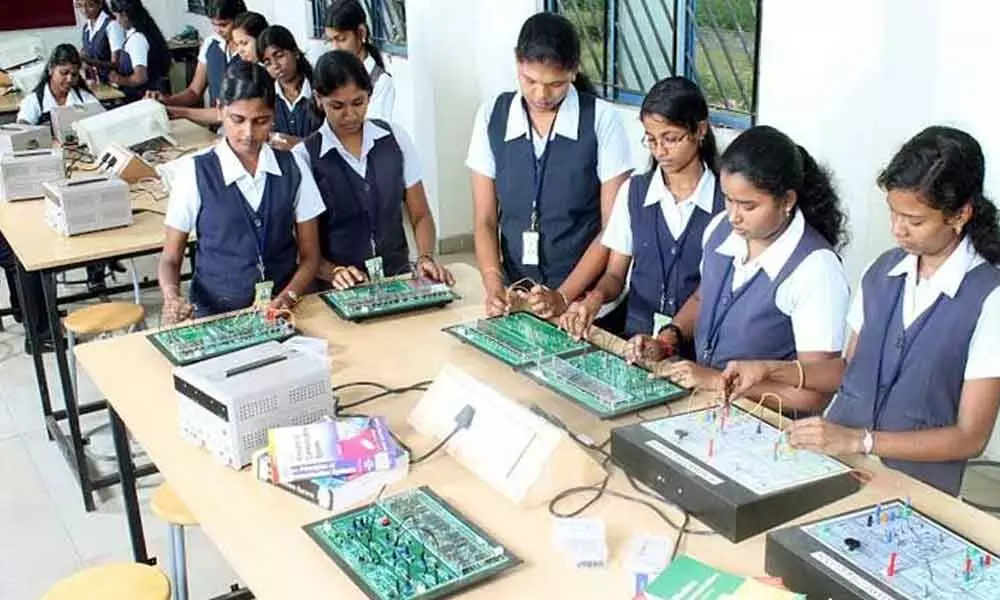Career in Electronics and Communication Engineering

Electronics have become as much a part of our life as oxygen, we will find them everywhere, the billboards, the phones, the computers, the refrigerators, the TV's and hundreds types of equipment's.
Electronics have become as much a part of our life as oxygen, we will find them everywhere, the billboards, the phones, the computers, the refrigerators, the TV's and hundreds types of equipment's.
We are surrounded by them, from plain jane devices, the devices are moving towards becoming smart, today we have vacuum cleaners, which, using the power of "Artificial Intelligence (AI)" can clean every corner of your home, we have a refrigerator that can be converted into a freezer or a fridge or vice-versa, we have devices that can control every device available in your home from any corner of the world, and this is just the tip of the iceberg, hence from necessities to comfort and to entertainment, electronics and communications rule the world.
Engineering is one of the most versatile degrees spanning multiple domains ranging from aerospace to automobiles to healthcare to business & many more. Engineers are at the center of innovation and one of the most sought after professionals in the Country.
They provide technological solutions to the problems, issues and ideas that affect every area of our lives and are responsible for technological advancements. Depending upon one's interest, one can specialize in multiple fields of engineering such as Electronics, Computer Science, Mechanical, and Civil & Aerospace amongst others.
Electronics and Communication Engineering is an ever growing industry in today's digital scenario. It is the utilization of science and mathematics applied to practical problems in the field of Electronics & Communication. It is due to Electronics engineers that we enjoy such modern communication devices as cellular telephones, radios and television.
Electronics and Communications Engineering (ECE) involves researching, designing, developing and testing of electronic equipment used in various systems.
Electronics is the technology associated with electronic circuits and systems, and is one of the major fields that come under electrical engineering. They mainly work to integrate electronics and communications into any system they develop.
Electronics is now part of our everyday life, from the mobile phones to televisions, computers and even the high-end advanced satellites that are helping us to lead a smooth life.
Ever since the evolution of technology, Electronics and Communication has become an essential discipline which is required by all the industries. Hence, Electronics and Communication engineering is one of the most sought after branches by students.
Electronics and Communication Engineering has also penetrated into other areas like healthcare, instrumentation, automation, remote sensing, signal processing etc.
Possibilities abound in every sphere - astrophysical, energy and even biological.
In India, some of the common specializations for Electronics and Communication engineering are below:
♦VLSI Design.
♦Digital Systems and Communication.
♦Opto-Electronics.
♦Digital Signal Processing.
♦Cyber Security.
♦Software Engineering.
♦Information Technology and Communication.
Eligibility
You can become an ECE engineer in two ways:
After 10th, go for Diploma in ECE from a recognized State technical institute. After Diploma, go for Degree BE ECE. You will get direct admission (Lateral entry) to second year of B.E.
based on your Diploma holders in engineering and graduates in Science with Maths as a subject with minimum 60% aggregate. OR
The four year bachelor's degree course in electronics and communication engineering is opened to students who have passed plus two with Physics, Chemistry, and Maths (PCM).Admission to engineering degree programme is through an Engineering Entrance Exam i.e. JEE Main & Advanced.
Skills required
If you are an ECE student, here are some of the skills and areas that you need to concentrate to improve your job prospects.
♦Strong interest in technology. Computer proficiency is a must these days; try to get acquainted with some of the industrial grade software's.
♦Develop communication and interpersonal skills.
♦Stay updated with the latest technologies by developing projects on them.
♦Do additional certified training programs to build your profile.
♦Complex problem-solving skills and a methodical mind.
♦Critical thinking.
♦Strong IT skills.
♦Time management and an ability to priorities and plan work effectively.
♦Develop leadership and team working abilities.
♦Scope and opportunities
Studying electronics and communication engineering is the dream of every second aspirant due to a number of reasons - growth, job opportunities, salary range and continuous industry growth. The major driving force for the present day Information Technology revolution is the development in Electronics Engineering.
ECE students can develop an exciting career in industries like consumer electronics manufacturing organization, Telecommunication & IT industries, Health care equipment manufacturing, Mobile communication (2G, 3G, 4G) Internet technologies, Power Electronics, and other industries like steel, petroleum and chemical industry etc.
Graduates in Electronics Engineering also have lots of opportunities in Government and private companies in the areas of design, manufacture, installation, operation, and maintenance of electronics equipment and systems.
With the advent of latest technological innovations, new opportunities came into existence for electronics & communication engineers. The latest technologies include self-driving cars, autonomous drone logistics, robotics, automation in industries, smart energy systems etc.
But getting acquainted with these industries will not be easy as they demand engineers who are more hands-on with the latest technologies. With the recent advancements in technologies, most of the industries are beginning to adopt robotics, automation technologies, smart energy systems, Internet of Things (IoT) into their process.
And a lot of these industries are established in Gulf countries, Germany, China, Canada etc. So students pursuing electronics & communication engineering have lot of job opportunities available, this is mainly because of the presence of various manufacturing firms outside India.
Electronics Engineers who are specialized in Control & Power Systems can find good opportunities in Japan, Germany, US & Korea. There is also a variety of job roles available in multi-disciplinary streams which an electronics engineer can take up.
Major technologies in which EC engineer can work:
♦Analog and Radio Frequency Circuits: Without these cell phones, Wi-Fi, television will cease to exist. A lot of industries are established to meet the consumer demands and in the process, they opened up lot of job opportunities for electronics engineers.
♦Communication & Signal Proce-ssing: This particular technology finds its application in transmission, storage and analysis of information signals.
♦Computer & Digital Systems: All the industries are able to advance technologically at a faster pace than before with the help of computers. These digital systems are everywhere from the smart watches to the mars rovers.
♦Networking: With the boom on the internet, we are experiencing 3G, 4G services which help the organizations and industries to easily collaborate with people. There is a lot of scope for engineers who want to work in this technology.
♦Computer vision & Image processing: These technologies are helping computers in the areas like medical, surveying, photogrammetry etc. For instance, now we have medical devices that can analyze data to not only display images but identify diseases too with the help of magneto-resonance imaging technology.
♦Control systems & Robotics: With the advancement in the technologies lately more and more industries are adopting automation and robots into their operations to improve their efficiency. And a lot more industries are expected to adopt these technologies in the coming years.
♦Remote Sensing: Communication via radio waves is essential for mobile devices, radios, and all the devices that are connected to the internet. From mapping to navigation, remote sensing plays vital role in various technologies.
♦Sustainable Energy & Power systems: Now industries are investing lots of their money and time to develop more efficient solar cells, windmills, systems that can generate power from tides etc. This technology offers wide range of job opportunities for electronics engineers.
Thus, the scope for electronics engineers in the coming years is not going to come down, but what will be the most challenging criteria is the skill level of engineers that the industries expect. With more technological advancements, industries of now are demanding engineers who are more hands-on and can assist immediately in their process.
To improve your job prospects you need to gain more practical skills in addition to your curriculum. For this, the best way to get skilled is to do learning by doing projects.When you learn and build projects you will not only learn the technical concepts but also get acquainted with the technology and develop a better understanding of them. You can attend any hands-on workshops or do some project-based courses to kick-start your learning of advanced technologies.
Top recruiters
Electronics and Communication Engineers are acquired by top recruiters (both private and government) like
♦DMRC
♦Siemens
♦Motorola
♦Texas Instruments
♦ISRO
♦DRDO, Accenture, Wipro, HCL Technologies, Samsung, Tech Mahindra, Infosys, TCS, Conexant, MTNL, BSNL, Indian Air Force, Indian Navy etc.
♦Many sectors like Television, Radio, News or Advertising sectors are some of the main recruiters of electronics and Communication engineering
List of few institutions
♦Indian Institute of Technology, Delhi
♦Indian Institute of Technology, Mumbai
♦Indian Institute of Technology, Kanpur
♦Indian Institute of Technology, Kharagpur
♦Indian Institute of Technology, Roorkee
♦Indian Institute of Technology, Guwahati
♦Indian Institute of Technology, Roopar
♦BITS, Pilani
♦NIT, Tiruchirapalli
♦SRM University (Chennai)
♦Delhi Technological University (DTU), Previously called DCE (Delhi College of Engineering)
♦VIT University - Vellore Institute of Technology
♦Manipal Institute of Technology, Manipal University - Manipal Academy of Higher Education
♦Thapar Institute of Engineering and Technology
(The list is indicative only)
Each person possesses a range of talents, interests and skill any of which could be the basis of a worthwhile career. Knowing your abilities and developing the necessary skills to be able to use them can help you target the area of possible job opportunities.
(The author is a Senior Counseling Psychologist)
Source: employmentnews









